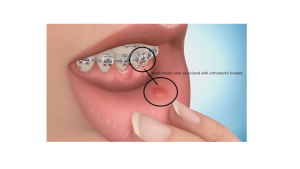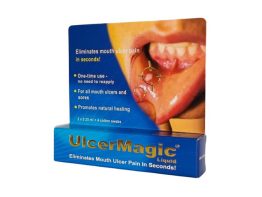Mouth ulcers, or canker sores, are painful lesions that can form on the soft tissues inside the mouth, including the gums, cheeks, tongue, and lips. These sores can make eating, drinking, and talking uncomfortable, and in many cases, poorly fitting dentures or braces are to blame. While both dental appliances are essential for improving dental alignment and function, they can cause constant friction and pressure when they don’t fit properly, leading to mouth ulcers.
Understanding the connection between ill-fitting dental appliances and ulcers is crucial for those who wear dentures or braces and experience recurring mouth ulcers. This article will explain why poorly fitting dentures or braces can lead to mouth ulcers and what you can do to address the problem and find relief.
Why Poorly Fitting Dentures or Braces Cause Mouth Ulcers
When dentures or braces don’t fit correctly, they can rub against the mouth’s soft tissues, causing irritation. Over time, this irritation can lead to minor cuts or abrasions that develop into ulcers. The constant movement of these appliances—whether from talking, chewing or even resting—creates repeated friction on the delicate tissue inside the mouth.
The mouth’s moist environment slows the healing process for these sores and makes them more prone to infection. This can lead to prolonged discomfort and difficulty performing daily activities like eating or speaking. Here’s a closer look at how dentures and braces contribute to the problem.
How Poorly Fitting Dentures Cause Mouth Ulcers
Dentures are designed to replace missing teeth, improving both function and aesthetics. However, if they don’t fit well, they can create friction against the gums and the inside of the cheeks. This friction can irritate and, eventually, mouth ulcers.
Common Causes of Poor Denture Fit:
- Changes in gum shape: Over time, the shape of the gums and jawbone changes due to bone resorption (the gradual loss of bone tissue). As a result, dentures that once fit well may no longer sit snugly on the gums, leading to movement and friction.
- Inadequate adjustments: New dentures may require several adjustments to ensure a proper fit. If the initial fit isn’t right or if adjustments aren’t made as needed, dentures can cause soreness and ulcers.
- Excessive pressure: If certain areas of the denture apply too much pressure on the gums, it can lead to localized irritation and sores.
Symptoms of Poorly Fitting Dentures:
- Sore spots on the gums or inside the cheeks
- Difficulty chewing or talking
- Dentures that shift or move in the mouth
- Ulcers that develop in areas where the dentures touch
How Poorly Fitting Braces Cause Mouth Ulcers
Braces work by applying gentle pressure to move the teeth into proper alignment. However, the brackets and wires used in braces can rub against the inside of the cheeks and lips, irritating. When braces don’t fit properly, or wires and brackets stick out, they can lead to frequent mouth ulcers.
Common Causes of Ulcers from Braces:
- Friction from brackets and wires: The metal brackets and wires can rub against the inside of the mouth, causing sores, especially in the early stages of wearing braces. If the brackets or wires are too large or improperly adjusted, the risk of ulcers increases.
- Loose wires: Wires that come loose or poke out from the brackets can irritate or cut the delicate tissue inside the mouth.
- Tight braces adjustments: After adjustments, braces may feel tighter, increasing the pressure on the soft tissues and leading to ulcers. This is common, but if the fit is significantly off, it can cause more damage than necessary.
Symptoms of Poorly Fitting Braces:
- Painful ulcers on the inside of the cheeks or lips
- Wires poking or cutting the mouth
- Soreness or irritation after an adjustment
- Constant rubbing of the braces against the soft tissue
How to Treat Mouth Ulcers Caused by Poorly Fitting Dentures or Braces
If you have mouth ulcers caused by poorly fitting dentures or braces, there are several steps you can take to alleviate the pain and promote healing. While it’s important to address the fit of your dental appliances, some treatments can help soothe the ulcers.
1. Visit Your Dentist or Orthodontist for Adjustments
The first and most important step is to consult your dentist or orthodontist. For denture wearers, your dentist may need to adjust the fit of the dentures to ensure they sit more comfortably on your gums. For braces, your orthodontist can check the alignment of the brackets and wires to minimize irritation. They may also offer special wax to cover any sharp edges of the braces causing ulcers.
2. Use Orthodontic Wax for Braces
If you wear braces and experience irritation from brackets or wires, orthodontic wax can provide a protective barrier between your braces and the soft tissue in your mouth. Simply place a small amount of wax over any brackets or wires rubbing against your cheeks or lips. This can prevent the formation of ulcers and allow existing sores to heal.
3. Use a Denture Adhesive for Dentures
If your dentures are loose or tend to move around, using a denture adhesive can help secure them, reducing the friction that causes ulcers. Adhesives provide a cushioning effect and make dentures fit more snugly on your gums. However, this is only a temporary solution, and you should still visit your dentist for a more permanent adjustment.
4. Apply Ulcer Treatment Gels
You can apply over-the-counter gels and creams designed to treat ulcers for immediate relief from the pain of mouth ulcers. These products create a protective barrier over the sore, helping to reduce pain and irritation while promoting healing.
UlcerMagic is a highly effective solution for mouth ulcers. It forms a protective layer over the sore, instantly reducing discomfort. UlcerMagic can speed up the healing process while preventing further irritation from your dentures or braces.
5. Rinse with Salt Water
Rinsing your mouth with salt water can help clean the ulcer and reduce inflammation. Saltwater has natural antibacterial properties that help prevent infection and promote healing. To make a saltwater rinse, dissolve half a teaspoon of salt in a glass of warm water and swish it around your mouth for 30 seconds several times a day.
6. Avoid Irritating Foods
During the healing process, avoiding foods that can aggravate your ulcers is important. Spicy, acidic, or salty foods can irritate the sore and prolong healing. Stick to soft, bland foods like yogurt, bananas, or oatmeal until your ulcers heal.
Preventing Mouth Ulcers from Poorly Fitting Dentures or Braces
While mouth ulcers caused by poorly fitting dentures or braces are common, there are steps you can take to prevent them:
- Ensure Proper Fit: Regular dental visits are key to ensuring your dentures or braces fit properly. If you notice any discomfort or shifting in your dentures, or if your braces are irritating, schedule an appointment with your dentist or orthodontist for an adjustment.
- Use Protective Barriers: Orthodontic wax can protect the soft tissue in your mouth for braces. For dentures, a denture adhesive can provide a more secure fit and reduce friction.
- Practice Good Oral Hygiene. Keeping your mouth clean and debris-free can help prevent ulcers and other oral health issues. Brush your teeth and dentures regularly, and use a soft toothbrush to avoid damaging the soft tissue in your mouth.
Conclusion
Poorly fitting dentures or braces can be a significant cause of mouth ulcers, but with proper adjustments and care, you can alleviate the discomfort and prevent future sores. Whether it’s adjusting the fit of your dental appliances, using protective wax, or applying UlcerMagic for fast relief, many solutions are available to help you manage and heal mouth ulcers. If you’re experiencing persistent ulcers, consult your dentist or orthodontist to address the underlying cause and get the relief you need.






